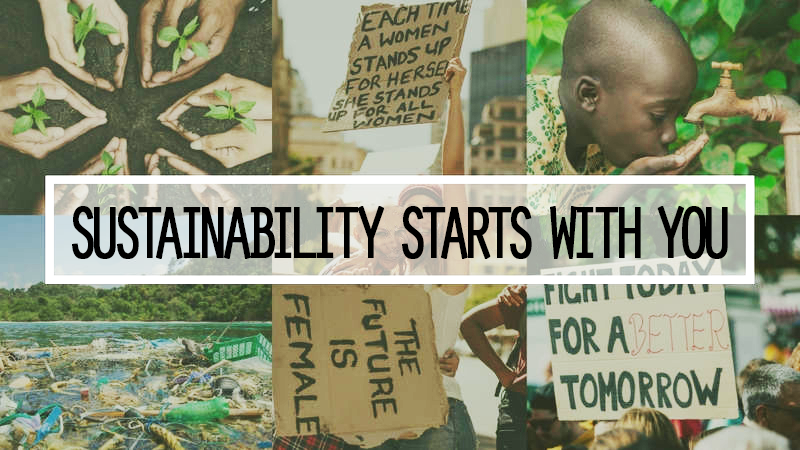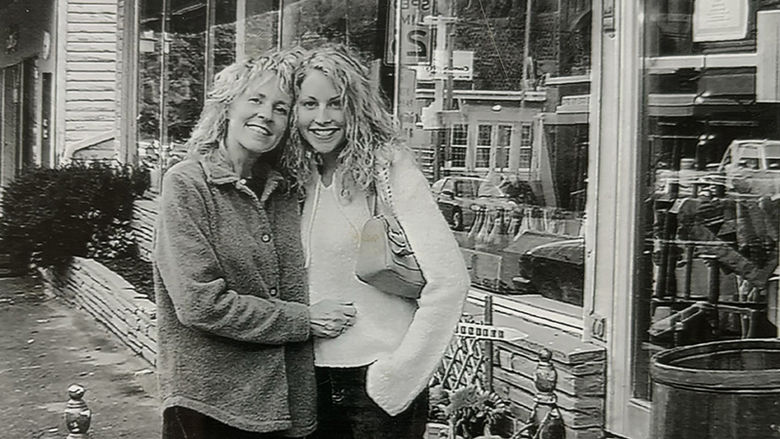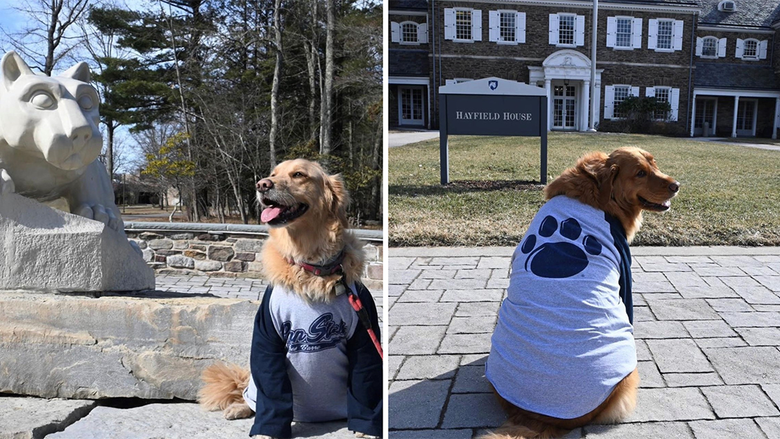

This dialog contains the full navigation menu for this site.

Penn State Wilkes-Barre is making strides in sustainability — and not just the green kind. While the word “sustainability” is often associated with recycling, clean water initiatives, and the protection of natural resources, the word refers to more than just climate action. At Penn State Wilkes-Barre, students, staff, and faculty are furthering sustainability efforts for the campus, the community, and the world.
In 2015, the United Nations set forth the 2030 Sustainable Development Agenda, a plan to create and ensure peace and prosperity for people and the planet, both now and for the future.
The plan is based around the 17 Sustainable Development Goals. The goals deal with climate action, civil rights, economic reform, and the reduction of inequalities for developed and undeveloped countries.
It was from these goals that the Penn State Sustainability Institute was born. By embracing Penn State’s values of Integrity, Respect, Responsibility, Discovery, Excellence, and Community, the Sustainability Institute aims to promote sustainable action across the Penn State campuses and the community as a whole.
Penn State Wilkes-Barre is taking this a step farther by promoting sustainability in the curriculum. All Penn State Wilkes-Barre students learn about the U.N.’s sustainability goals during their First-Year Seminar course. From there, students can continue to learn about sustainability in any of the 18 courses (both electives and major requirements) that have been designed with these goals in mind. A number of staff and faculty are also heavily involved with sustainability on campus.
Sisters Ann and Erin Brennan are professors at Penn State Wilkes-Barre. Ann Brennan teaches writing and literature and also serves as assistant to the chief academic officer. Erin Brennan is a licensed attorney in both Pennsylvania and New York. Erin Brennan joined Penn State as an assistant teaching professor of business in the fall of 2018. She teaches at the Wilkes-Barre campus and for the World Campus. In addition to their individual course offerings, the sisters teach a course together.
Ann Brennan said her interest in sustainability started in college.
“I graduated from Marywood University, where sustainability is an integral part of the university’s mission and prioritized in everything from construction to the curriculum. My college years really showed me the importance of living responsibly in a diverse and interdependent world. This credo became part of my ethos,” she said.
“It was the logical next step to weave sustainability into my professional life at Penn State Wilkes-Barre. I began by teaching Literature and Nature. Then I developed a place-based focus for my freshman composition course. And over the years, my involvement has grown beyond the curriculum, across campus, and into the community," Ann Brennan said.
Soon after joining the Penn State Wilkes-Barre faculty, Erin Brennan joined her sister’s mission.
“When I came to Penn State, I saw what Ann was doing with her students and how she blended these concepts into her classes. From there, I began to form curriculums and programs to help educate about the concepts and on how to make sustainable changes,” said Erin Brennan. “Together, Ann and I developed, and now teach, Issues in Sustainability at Penn State Wilkes-Barre.”
Issues in Sustainability (SUST 242N) is a writing-intensive course that uses literature and other media methods to examine problems involving sustainability.
“In this course, we introduce the 17 United Nations Sustainable Development Goals, identify and analyze the challenges associated with achieving each of those goals, provide opportunities for critical reflection, and encourage examination of actions both in service to and against those goals,” said Ann Brennan. “The course examines these issues from humanities, business and legal lenses to underscore the complexity of the challenges and the different ways we think and act.”
“We present these topics through the three Penn State concepts of live, learn and lead. We teach students about the way these concepts impact the lives they live, teach them how to identify these issues, address them, and advocate for change, and then we hope that they go on to lead others to do the same,” said Erin Brennan.
“This generation of students knows that we want to and need to live more sustainably, but they need help to finish the process. We hope that our class gives them the resources they need to cross that finish line.”
Of the 17 sustainability goals, both sisters agreed that goal 17, Partnership for the Goals, was of critical importance.
“Partnership for the goals is the most important, because we all have to do this together. We can’t ever get to a place to achieve these goals without working together,” said Erin Brennan. “The idea is that we want to thrive and endure as a college, community, Pennsylvania and global community.”
It’s not just staff and faculty who are hopping on the sustainability train. Penn State Wilkes-Barre students are making waves and working on building a brighter tomorrow. Angie Allen and Hallie Sanchez are Penn State Wilkes-Barre students taking the Issues in Sustainability course with the Brennans.
Angie Allen is a sophomore pre-medical student. Before taking Issues in Sustainability, Allen was familiar with the concept of sustainability but didn’t have much background in it.
“I knew that sustainability was becoming a more prominent topic in the fashion industry, but I really didn’t know much about it,” said Allen. “Over the course of the semester, this has easily become my favorite class because Ann and Erin have done a great job of having interesting and educational course materials. I am learning new ways to introduce sustainability into my everyday life each lecture.”
Hallie Sanchez is a a sophomore IST major. Sanchez came to class with a little more experience, having learned about the issue in high school.
“What drew me most to sustainability was its overall goal to make sure everyone has a chance of having a good quality life where their needs and basic human rights can be met,” Sanchez said. “Some people may think that sustainability only cares about the physical environment, but what many fail to realize is that environmental problems, such as a lack of clean water, can affect many marginalized groups of people as well.”
While on-campus projects have been put on pause due to the pandemic, SUST 242 students were challenged with creating sustainability awards to recognize the actions of students, staff and faculty at Penn State Wilkes-Barre. The goal was for students to take what they learned in class and examine how these actions were displayed throughout campus.
“My award pertained to the water refill stations we have on campus. I use those water stations all the time and I didn’t even know the impact of what I was doing before this course. I created an award that would be hung above those refill stations telling whoever was using it that they are being sustainable,” said Allen.
Sanchez said, “I decided to award the Gender and Sexuality Alliance here at Penn State for contributing to goal #16, Peace, Justice and Strong Institutions, and goal #10, Reduced Inequalities. It is important for an institution like Penn State Wilkes-Barre to have organizations like this because they create a safe space for people to talk about issues concerning the LGBTQ+ community, and it also demonstrates that Penn State cares about what that community has to say.”
Allen and Sanchez are among the many students who have dedicated time and resources to the study of sustainability. On campus, students have begun to take notice of how little things can have a large impact.
“At the Penn State Wilkes-Barre campus, there are a variety of efforts we are making that work toward sustainability. We have water stations that are used to refill bottles, which reduces our plastic waste. In most classrooms we have motion-sensor lights, which conserve energy. There are clubs pertaining to reducing inequalities. Also, the Eco-Coin system in our bookstore reduces plastic bag use,” said Allen. “Something I would really want to see happen on campus is Meatless Mondays. By encouraging our students to avoid meat on Mondays, we can reduce greenhouse gas emissions, which are a huge cause of global warming, and limit depletion of natural resources like water, land and energy.”
“My goals are to educate my friends and family on this topic; focus on responsible, sustainable product choices; and improve my own efforts as much as I can. It is hard to see how to individually have an effect on such a big issue, but through this course I have been able to identify ways to make an impact,” said Allen.
Penn State Wilkes-Barre offers a number of programs that educate students about sustainability and events that can help them implement what they have learned. The campus’ Sustainability Council offers several events that are open to the public, as well as information on what the campus has done to help further the cause.
“The easiest way to get people involved is to make them aware of how their actions play into sustainability to encourage them to continue. The only limit is what your own interest is,” said Erin Brennan.
Students are also encouraging the public to get involved.
“The more I learn about the problems that correlate with sustainability, the more I want to be a part of the solution. If other students and the community members knew about all the issues the Sustainable Development Goals work toward solving, I am sure they would want to get involved,” said Allen.
Learn more about Penn State Wilkes-Barre’s sustainability efforts and what you can do.

